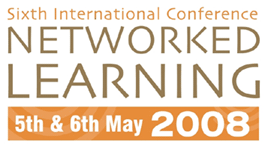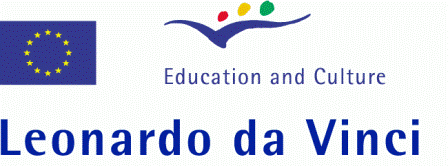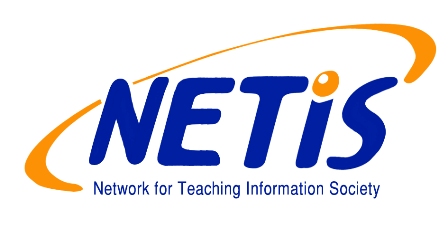

Information Society Studies in Practice – a Networked Learning Case Study
Symposium Convenor: Robert Pinter
Information Society Research Institute, Budapest University of Technology
and Economics, pinter.robert@ittk.hu
Symposium Introduction
This symposium contains four papers and focuses on teaching information society in traditional and networked learning in four European countries. The results introduced in the symposium are based on the work of the NETIS consortium (Network for Teaching Information Society), a project supported by the European Union under the Leonardo da Vinci Programme. NETIS is developing a course book and textbook and organising classes in four participating countries to test its materials.
Symposium members are all representatives from institutes participating in NETIS. The two-year-long NETIS project ends in November 2008 and the Networked Learning Conference is one of the main events to present the findings of the project. Symposium participants will introduce the NETIS project in general (Pinter), present the findings from the student's (Sadler and Kalvet) and teachers perspective (Bessenyei and Stoffa) and finally summarise the experiences of the project regarding multicultural diversity in networked learning (Siakas).
For more details on the NETIS project and on the presentations in the
symposium in general see the abstract and paper of Pinter.
Information Society Studies in Practice - a Networked Learning Case Study
Robert Pinter
Information Society Research Institute, Budapest University of Technology
and Economics, pinter.robert@ittk.hu
Abstract
NETIS (Network for Teaching Information Society) is a consortium, the aim of which is to develop a course as part of a two-year programme (2006-2008), with the support of the European Union funded Leonardo da Vinci Programme. The course prepared by NETIS is designed to provide an introduction to information society studies mainly for undergraduate students. Our aspiration is that a model course will be designed based not only on the prepared teaching materials but also on the experiences of teachers as well as students, and that it will hopefully be regarded as being of a high standard all over Europe.
The course book was published first in Hungarian in 2007 and will be published in English and Greek in 2008, and prepared in printed, in Moodle and in CD versions. Obviously it is not only students who can benefit from a course book like this but also teachers, researchers, experts and all those who find this area interesting. Because the book is written in modules with each topic as an independent unit in itself as well as part of the larger whole, it is not necessary to read the course book in its entirety. The book covers the following topics:
- the concept, theory and history of the information society,
- the social role of technology,
- the network society and economy,
- the use of space and changes in social relations pertaining to space,
- the growing significance of innovation in the economy and in society,
- issues of legal regulation,
- the information society strategy of the European Union,
- electronic government and administration,
- the digital divide and e-equal opportunities,
- digital culture, the digitalisation of the cultural heritage, information literacy,
- electronic education, life long learning.
The course book is supplemented with a separate collection of readings to provide further help to students (i.e. textbook with studies, student papers and country reports). Based on these materials courses were taught in several institutions of higher education from the autumn of 2007 in Hungary, England, Greece and Slovakia, both through traditional learning and e-learning.
Based on the results from teaching and research findings of our project we can describe the experiences of students and teachers, their expectations and impressions. The aims of this research are to give methodological advice to teachers on how to teach our course book, to teach information society in general, to teach a blended learning course with the use of a Moodle system, and to teach in a network with other teachers and students.
NETIS also helps to understand the adoption of such materials and curriculum in different countries. The conclusions are beneficial not only for teachers and researchers on information society but also for any teacher who plans to use e-learning systems, plans to teach a blended learning course, plans to have networked learning or organizes international collaboration in education.
The NETIS team introduces the project itself, and its general experience
in a separate panel at the 6th Networked Learning Conference: teaching
methods regarding networked learning based on feedback from students and
teachers and cultural aspects of the project. This article provides the
general introduction for the project and the other papers concentrate
on the results in the most important fields.
Full Paper - pdf.
Information Society Studies in Practice - a Networked Learning Case Study:
student needs and feedback in the NETIS project
Chris Sadler
School of Computing Science, Middlesex University, c.sadler@mdx.ac.uk
Tarmo Kalvet
Praxis Center for Policy Studies, tarmo@praxis.ee
Abstract
The Network for Teaching Information Society (NETIS) consortium has designed an Information Society studies curriculum aimed at university undergraduates. Courses can be delivered in various pedagogic formats including (appropriately) networked learning.
NETIS has consulted students prior to developing this curriculum and trialled the learning materials in different contexts. Between January and March 2007 an online questionnaire was administered to students at a number of NETIS partner institutions. 492 students provided responses.
As most useful sources of information students considered the Internet (53% of students listed it as their first or second choice) followed closely by the recommended course textbooks (52%). Surprisingly, only 32% listed their teachers as first or second choice and (more surprisingly) 21% listed teachers as the least favourite. Although the majority (60%) chose a course of conventional lectures supported by online materials (blended learning) as preferred learning style, fully a quarter of the students opted solely for the conventional lecture course. Only 4% would prefer an online-only course. When asked about preferred offline resources, students opted overwhelmingly (80%) for lecture notes or a dedicated textbook as opposed to more general library or other resources.
About half of the student sample reported that they had already taken an Information Society course although there was the widest national variation here with 82% of Hungarian students having taken such a course, but only 11% of the United Kingdom students. However, 56% of all students claimed to have an interest in the topic and 80% thought that a textbook on the topic would be desirable. 60% of the students wanted a printed copy of the material in addition to access to an online format (20% were only interested in a printed version).
In sum, e-learning 1.0 (traditional lectures supplemented by the online learning materials) fits with the declared study preferences of the majority of our student sample, who are happy to use online resources to supplement the physical learning environment comprising face-to-face contact with lecturers and printed materials. Although little enthusiasm was shown for the characteristic features of e-learning 2.0, it was tested in the teaching at some centres that started in September 2007.
The experience shows that NETIS has designed an Information Society studies course which is suitable to a wide range of university undergraduate students. Although preliminary enquiries about students' preferred learning styles was not very encouraging, it turns out that students can embrace this pedagogy with some enthusiasm, provided that the teachers are willing to put in the effort. In one of the teaching locations the students made extensive use of the interactive tools.
They seemed to enjoy engaging in knowledge creation and enthusiastically
monitored the growth of entries in the course dictionary. It was clear
that they enjoyed sharing solutions with other students and groups and
that they learned from this sharing. Another university plans to try an
entirely e-learning course with students in sociology and then to compare
results with the group that used more traditional approaches.
Full Paper - .pdf
Information Society Studies in Practice - a Networked Learning Case Study:
Experiences of Teachers in NETIS project
István Bessenyei
Information Society Research and Teaching Group, University of West Hungary,
i.bessenyei@externet.hu
Veronika Stoffa
Department of Informatics, János Selye University, NikaStoffova@seznam.cz
Abstract
Traditional centralised knowledge sharing in an eLearning environment with intensive communication and feedback tools lead to "traffic collapse". The solution can be a horizontal, networked communication between students, between specialists and students, and between institutions.
Participants in networked learning need information about the knowledge structure of each other. The problems are: in which way can we document and share the knowledge in the learning network? What kind of knowledge do we have? In which way can we register and document the prior learning experiment, the tacit knowledge? A possible solution can be the using of knowledge maps and e-portfolios as tools for knowledge sharing. The learning goals in form of sophisticated competence portfolios are helpful tools to manage the self organised learning process and the knowledge sharing in the learning network. The participants can check the competences on their own and steer the learning due to this self evaluation. To reach the given learning goals the course provided so called creative tasks for students.
The most difficult part of the project was to organise effective knowledge sharing between students and to involve other tutors and other student groups in a common learning environment.
The spread of new forms of learning also implies various potential conflicts.
There are numerous signs that the new forms of informal network learning
can only be fitted into the narrow, bureaucratically controlled framework
of traditional institutions that are limited in time and resources, with
great difficulty. The pedagogical debate concerning this issue often goes
in the wrong direction, because the discussion is between two incompatible
conceptual worlds. The linear model and the eLearning 2.0 are two different
worlds with different logic and different ideas. An important question
of the coming period will be that how the institutions of the official
school system will accept this phenomenon. To what extent will the institutions
integrate this new logic, and what types of conflicts, compromises and
solutions will this process result in?
Full Paper - .pdf
A Distributed Multicultural Network for Teaching Information Society:
Cultural Diversity Aspects
Kerstin V. Siakas
Alexander Technological Educational Institution of Thessaloniki, Department
of Informatics, siaka@it.teithe.gr
Abstract
In today's rapidly changing global environment, governments, organisations and citizens face more challenges than ever. Developments in ICTs, the globalisation, as well as the Lisbon and Bologna objectives have set new demands on education, requiring a new paradigm of educational systems and pedagogic processes. As a result, learning is globally susceptible to remarkable changes. Visions and goals of life-long learning have to be defined in order to design the new paradigm of education. The pedagogic process involves a huge complexity comprising internal and external stakeholders, such as students, educators, managers, funding providers and the society as a whole. The product of this complex process is both tangible in the form of qualified learners/graduates and less amendable to quantification in the form of accomplishment of higher level ideals and attitudes as well as transferable knowledge and skills. In order to respond to the changes in technology and the subsequent consequences, proactive policies are needed at European, national and educational institution levels.
This paper reports on the experiences gathered from the Network for Teaching the Information Society (NETIS), aiming to meet the emerging requirements by developing a life-long networked technology-based teaching-and-learning environment, by partners from Hungary, England, Estonia, Greece and Slovakia. In particular we discuss challenges of networking in an intercultural diverse environment, including challenges regarding research and teaching Information Society aspects on the same e-learning platform to students from different educational environments, encompassing different disciplines, and from different national cultures with different languages.
The importance of taking the cultural particularities and the national ICT environment into consideration is highlighted. Many consider that the internet creates so called "converge values" and that managing and operating ICT in a global context is largely the same as managing and operating ICT in a domestic localized context. The other view proposes that there are differences depending on cultural aspects, different business and legal environments, different languages and varying technology availability. A major critique on the current EU policy process has been articulated regarding the failure of the EU to recognize and adjust its policy to the existing cultural particularities of its Member States. The question seems to be whether digital divides constitute 'cultural divides' having an impact on the policy, regulation and future evolution of the EU Information Society. The EU policy needs to take into account the socio-cultural particularities of each EU Member State without loosing its broad scope and common aim across the EU.
Educational institutions, educators and education procedures influence the pedagogic process, the learning context, as well as the broader societal context comprising political, economic, technological and socio-cultural aspects. On the other hand, the societal context influences institutions within respect to their structures, strategies, management processes and means of operating procedures, including technology and individuals, as well as the context of learning.
To address the multicultural diversity, we emphasize particular caution and awareness of particularities, such as differences in national Information Society adoption levels, institutional regulations, disciplines (students from informatics and social sciences), language, attitudes and values, as well as operational issues, such as numbers of students that will participate in the Information Society course in the different countries. Our approach aims to combine classroom experience and research evidence aiming for continuous improvement.
The NETIS course is taught for two semesters by using different degrees
of blended learning depending on country. In addition to the communication
via the Moodle e-learning platform social networks are used for generating
content by users (educators and students) and for knowledge sharing. Experiences,
both from students and from educators, are evaluated and reported.
Full Paper - .pdf
.

This project has been funded with support from the European Commission.
This publication reflects the views only of the author, and the Commission
cannot be held responsible for any use which may be made of the information
contained therein.
| About NLC |
2008 Conference Papers
| Conference Committee| Keynote
Speakers
| Papers from previous NL conferences |Research Seminars| Current Conference
| Sponsors | Contact
|
